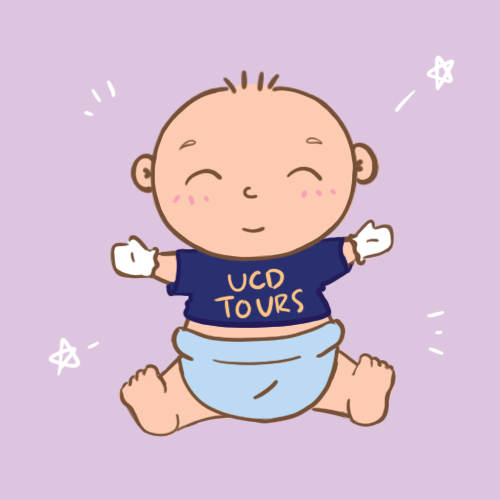But she can’t walk forwards, which is a bit sad, actually
By ELLIE SCHULTZ — eeschultz@ucdavis.edu
Last week, UC Davis alumni Johannes and Clarissa Tompkins brought their 13-month-old daughter, Agatha, into Dr. Jennifer Cronenberg’s developmental genetics lab. Agatha, named in homage to her parents’ alma mater, only walks backward.
“She just got up and took a few long strides back without even looking behind her,” Clarissa recalled. “She maintained perfect eye contact with me while she did it.”
The couple met back in 2012 when they bumped into each other at the MU while giving their respective campus tours. Of course, both became much more skilled at walking backward before they graduated. In fact, Johannes still works as a guide in Old Town Sacramento. For the last month, Agatha has made backward strides around the house, at the park and into countless doctor’s offices, leaving health professionals utterly dumbfounded.
This case has Cronenberg and her lab staff completely reconsidering their stance on genetic determinism.
“This isn’t a mutation,” Dr. Cronenberg said. “Tompkins’ years of projecting over the racket of superfluous construction projects and walking the vastness of this very campus, the largest UC in acreage, have simply resulted in a child genetically-suited to be a tour guide.”
Imaging of Agatha’s feet shows a consistent morphology; a flatter ball and significantly more flexible tendons compared to the average human.
Though baby Agatha hasn’t said her first words yet, Johannes hopes that when she does speak, her voice will be “kind, but deafening,” ready to follow in her parent’s footsteps.
Of course, the Tompkins want their daughter to enjoy childhood before being thrust into work because life as a tour guide can be draining. Long hours, excessive physical activity and endlessly dumb questions (there is most definitely such a thing) have historically deterred capable individuals from this line of work. But unfortunately, after taking more in-depth scans, it seems as though backward is the only direction Agatha will ever be able to walk.
Back in Cronenberg’s lab, the staff has seen Agatha as a glimmer of hope for an otherwise doomed human race. Research assistant Leann Briggs reflected on this moment, almost forgetting that the university doesn’t pay her a living wage: “Maybe we aren’t completely set to evolve into technologically-dependent life forms, fused into our desk chairs. There are some funky fresh genes floating around, and maybe if I procreate with another grad student, our child will be able to survive without being able to cover the cost of living!”
Written by: Ellie Schultz — eeschultz@ucdavis.edu
Disclaimer: (This article is humor and/or satire, and its content is purely fictional. The story and the names of “sources” are fictionalized.)










